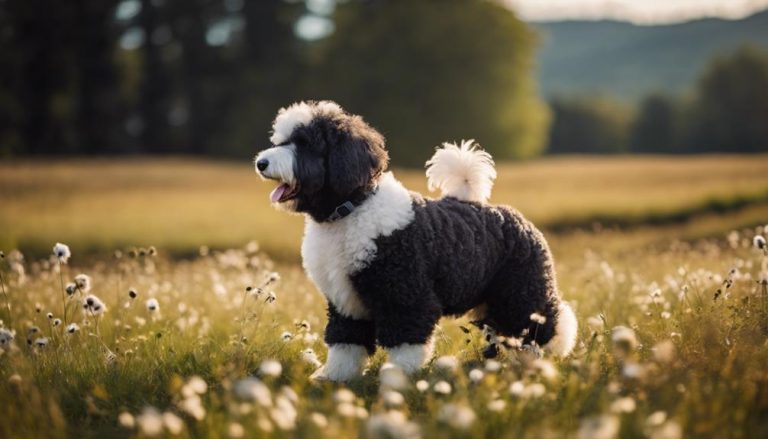Sheepadoodle: Intelligent, Loyal, Hypoallergenic Companion
The Sheepadoodle is a unique mix from the United States, combining the intelligent Poodle with the friendly Old English Sheepdog. This mix results in a dog that doesn’t shed much and is suitable for people with allergies. They are versatile and easily fit into different home environments, making them great family pets. Known for their soothing nature, Sheepadoodles have a gentle temperament paired with a keen awareness, which is especially helpful for those with allergies. They grow to be about 16-22 inches tall and weigh between 65-85 pounds, so they need careful feeding and looking after. Their coats require regular grooming to keep them healthy and free from tangles. With enough physical activity, mental challenges, and grooming, Sheepadoodles thrive.
These dogs are adaptable, have specific health considerations, and work well with families.
Key Takeaways
- Sheepadoodles mix Poodle and Old English Sheepdog traits, offering hypoallergenic coats.
- They fit any home in standard, medium, and toy sizes.
- Grooming and exercise are essential; they need daily activity and coat care.
Quick Facts
Sheepadoodles are an American hybrid breed known for their versatility and adaptability to various living conditions, making them a perfect match for many families. These dogs come in standard, medium, and toy sizes, fitting different home environments. Originating from a Poodle and an Old English Sheepdog mix, Sheepadoodles combine the Poodle’s smarts and low-shedding coat with the Sheepdog’s strength and friendliness.
These dogs are available in sizes ranging from the larger standard Sheepadoodles, which can weigh more than 50 pounds, to the compact toy Sheepadoodles, ideal for smaller living spaces. All sizes share similar health needs, highlighting the importance of regular vet visits to ensure a long, healthy life of 12-15 years. Their non-shedding coats make them especially appealing to people with allergies. At the same time, their loving nature solidifies their position as a top choice for those looking for a dedicated and low-maintenance pet.
Overview
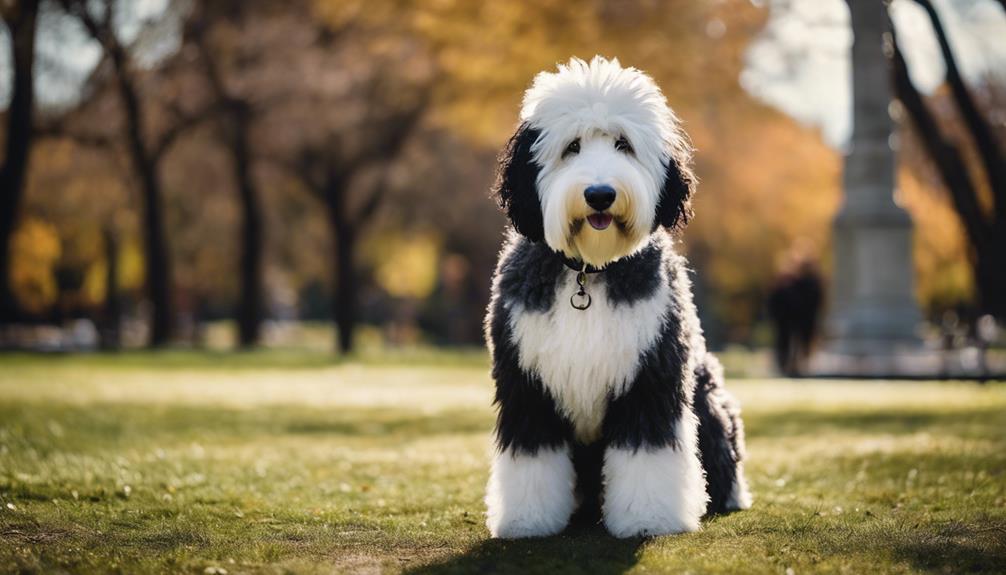
Exploring the world of Sheepadoodles, these dogs are a unique blend of a Poodle and an Old English Sheepdog. This mix brings together the best of both worlds, resulting in a loving and hypoallergenic breed. Thanks to their non-shedding coats, which often display a striking black-and-white pattern, they’re perfect for families and those with allergies.
Sheepadoodles are not just about good looks; they’re incredibly affectionate and make excellent companions. Their size varies, making them adaptable to different living situations, from apartments to homes with spacious yards. These dogs are becoming popular as therapy animals and emotional support pets because they’re naturally gentle and form strong bonds with people.
Training Sheepadoodles is usually a smooth process. They inherit their intelligence and eagerness to please from both parent breeds, which makes them highly trainable. This adaptability in training solidifies their status as beloved pets. Their role extends beyond companionship, as they’re increasingly recognized for their therapeutic benefits, thanks to their calm and loving nature.
Snoopy Lookalike
Mini Sheepadoodles have captured the hearts of many with their striking resemblance to Snoopy, the beloved cartoon character. Known for their fluffy coats and adorable teddy bear-like faces, these dogs are the epitome of cuteness, much like Snoopy himself. A standout among them is Bayley, a Mini Sheepadoodle who has become quite famous for embodying the Snoopy lookalike traits perfectly, winning over many with his delightful looks.
The appeal of Mini Sheepadoodles goes beyond their cute appearances. They also require specific care, particularly in grooming, to keep their fluffy coats in top condition, which is crucial for maintaining their Snoopy-like allure. Here’s a brief overview of what makes them so unique:
| Feature | Description |
|---|---|
| Size | They have a more petite build that reminds one of Snoopy. |
| Fluffy Coat | Their coats need regular grooming to stay fluffy. |
| Teddy Bear-like Face | This feature makes them look like Snoopy. |
| Personality | They are as charming and lovable as Snoopy. |
Choosing a Mini Sheepadoodle means bringing a piece of childhood nostalgia into your home, thanks to their similarity to Snoopy. They’re not just a joy to look at but also get the same joyful and nostalgic vibe that Snoopy represents in the lives of their owners.
Origins: Poodle and Sheepdog Mix
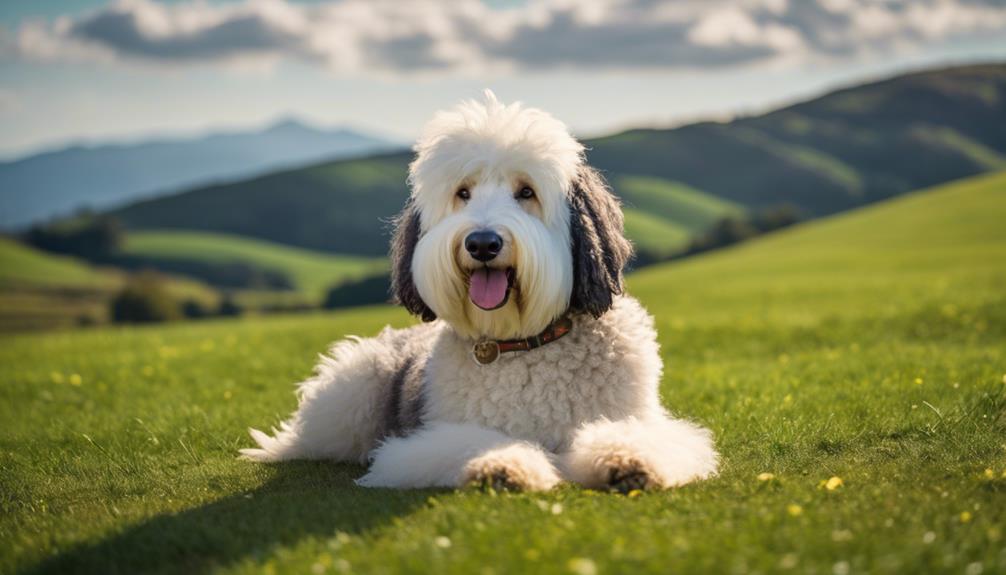
The Sheepadoodle is a unique mix created by breeding Poodles with Old English Sheepdogs. This combination combines the best qualities of both breeds, making a dog that’s both a great companion and valuable. In our conversation, we’ll look at:
- How did this mixed breed come to be, and what was its background?
- The standout features that come from its Poodle and Sheepdog ancestors.
- What you need to know about keeping a Sheepadoodle healthy and happy.
- Why their mixed traits make them excellent pets.
The Sheepadoodle’s origin goes back to the desire for dogs that are both good friends and helpers. Mixing Poodles and Old English Sheepdogs was a deliberate choice, aiming to create a dog with a great temperament and the ability to adapt to various needs. This mix has become increasingly popular for its balanced blend of intelligence, friendliness, and versatility.
Sheepadoodles inherit remarkable traits from both parents. They get their intelligence and hypoallergenic coats from the Poodle side, while the Sheepdog contributes to their calm demeanor and loyalty. This makes them affectionate family pets and capable of activities requiring intelligence and endurance.
Regarding health and care, Sheepadoodles are generally healthy, but like all breeds, they have specific needs. Regular exercise, mental stimulation, and a healthy diet are essential. Their coats, which range from curly to straight, require regular grooming to keep them looking and feeling good.
Their combination of traits makes Sheepadoodles stand out as pets. They’re adaptable, making them suitable for various living situations, from apartments to large homes with yards. Their friendly nature and intelligence make them great for families, individuals, and even working dogs in roles such as therapy and assistance.
Mix Breed, Genesis,
Sheepadoodles are the result of crossbreeding Poodles with Old English Sheepdogs. The goal was to merge the Poodle’s intelligence with the Sheepdog’s calm demeanor. This mix creates a pet that’s both smart and easygoing. They also have a coat that doesn’t shed much, making them a good match for allergy sufferers. This breeding effort was designed to produce a dog that fits well into family life while being more accessible for those with allergies.
The combination of Poodle and Sheepdog genes influences the Sheepadoodle’s personality, looks, and how they should be cared for. This blend marks a critical point in the development of mixed-breed dogs.
Unique Traits Display
To truly get to know Sheepadoodles, looking at their background is essential. They’re a unique blend of Poodle and Old English Sheepdog genes. This mix combines the Poodle’s smarts and allergy-friendly coat with the Old English Sheepdog’s friendly and loving nature. Studies of their genes show they get the best of both, making them easy to train and great for families and therapy dogs. Their coats are diverse, often with eye-catching black and white patterns, highlighting their distinctiveness. Sheepadoodles are a perfect example of how combining two renowned breeds can create an ideal companion for various settings.
Breaking down their traits, intelligence and hypoallergenic coats come from the Poodle side. These features make them intelligent and suitable for people with allergies. The friendly and loving behavior is thanks to the Old English Sheepdog. This makes Sheepadoodles excellent family pets and helpers in therapeutic settings. Their looks are also unique, with coats varying wildly, but they often have a striking black-and-white color scheme. This mix of qualities shows how well the Poodle and Old English Sheepdog blend to produce a dog that’s both a joy to train and live with.
Health & Care Insights
Looking into the health and care needs of Sheepadoodles, we see how their mix of Poodle and Old English Sheepdog genetics plays a significant role in their lifestyle and care. This mix brings together traits like low shedding, which means they need regular grooming to keep their coats healthy and prevent knots. These dogs are intelligent and love being around people, sometimes making them feel anxious when left alone. They must get enough play and walks daily to keep them happy and mentally sharp.
Sheepadoodles are generally healthy but can cause common health issues like hip dysplasia and eye conditions. This makes regular vet visits and choosing responsible breeders who prioritize health important for keeping them well. Taking care of a Sheepadoodle means being proactive and informed about their needs.
Medium to Large Breed
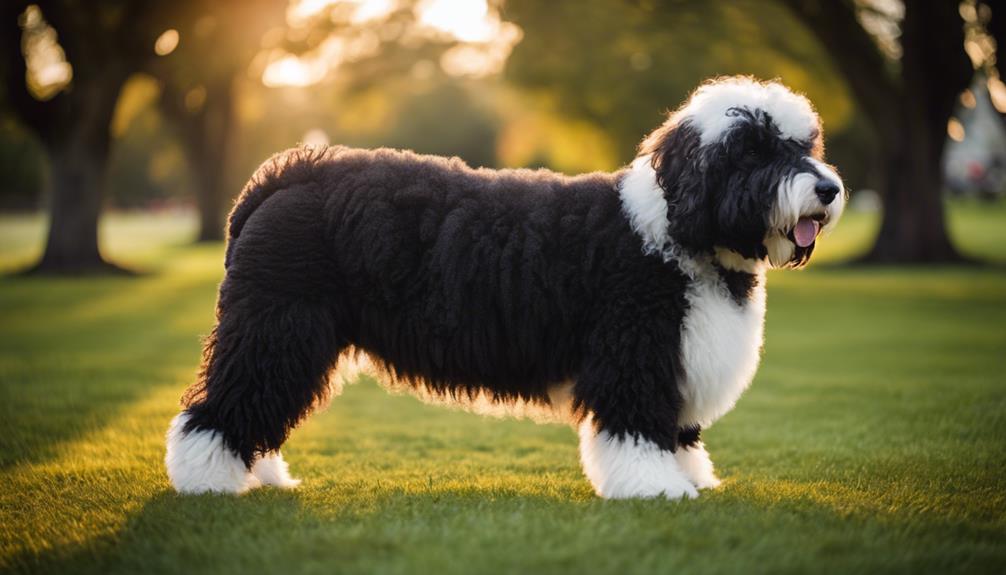
Exploring the Sheepadoodle, a blend of medium to large dog breeds offers an insight into their unique size and care needs. This breed proliferates, transitioning from a playful puppy to a robust adult. Their rapid growth requires attention to diet and exercise to ensure they develop properly.
Sheepadoodles need plenty of physical activity to stay healthy. A daily walk or playtime in the yard helps meet this requirement. Their coats, a mix of their Sheepdog and Poodle parents, need regular grooming to prevent mats and keep them looking their best.
Understanding potential health issues is critical for Sheepadoodle owners. They may inherit conditions from their parent breeds, so regular vet check-ups are essential. This knowledge helps provide the best care for these loving and energetic dogs.
Size and Growth
Understanding the growth and size of Sheepadoodles is crucial for their well-being. These dogs, falling into the medium to large category, grow to be about 16-22 inches tall and weigh around 65-85 pounds as adults. Their size doesn’t just affect how much space they’ll need and highlights the importance of proper care during their growth phase to ensure they remain healthy.
Sheepadoodles grow steadily during their first 12 to 18 months. This time is critical for providing the proper nutrition and environment to support their growth into robust adults. Keeping an eye on their weight and bone development is essential to avoiding health issues arising from improper growth in larger breeds.
Exercise Needs
Sheepadoodles, medium to large dogs, need 1-2 hours of exercise daily to stay healthy and happy. It’s crucial to mix their workouts with physical activities, like fast-paced walks and playtime, and mental exercises to keep them from getting bored and acting out. These dogs love to stay active and must be physically and mentally challenged to thrive.
If a Sheepadoodle doesn’t get enough exercise, it might start showing behaviors you don’t want. They do best in homes with plenty of exercise and mental stimulation. Keeping them engaged with interactive toys and games is great for their overall well-being.
Grooming Requirements
Keeping a Sheepadoodle‘s coat healthy and free of mats requires regular grooming, including brushing several times a week and visiting a professional groomer every few months. Sheepadoodles, a mix between Old English Sheepdogs and Poodles, have coats that can vary widely in texture, so grooming needs to be customized. Staying on top of grooming helps avoid mats, which can cause discomfort and skin issues.
Brushing your Sheepadoodle a few times each week is essential, and professional grooming sessions every few months help keep their coat in good condition. These grooming times are also perfect for checking the dog’s skin for any problems, ensuring they stay healthy.
Health Concerns
Sheepadoodles, a crossbreed between Old English Sheepdogs and Poodles, encounter several health challenges typical of medium to large dogs. This includes hip dysplasia, a condition where the hip joint doesn’t form properly, which can severely affect a Sheepadoodle’s ability to move and enjoy life. Regular visits to the vet are crucial for early detection and management of this problem.
These dogs may also suffer from eye issues such as cataracts and corneal dystrophy. Keeping an eye on their eye health with the help of a vet can help prevent these conditions from worsening. Another serious concern for Sheepadoodles is bloat, a rapid, life-threatening stomach condition. Knowing the signs and getting quick medical help is vital.
To keep Sheepadoodles healthy, focusing on routine veterinary care, balanced nutrition, and regular exercise is essential. Supporting responsible breeders who prioritize the health of their puppies can also make a big difference in preventing these conditions.
Family Compatibility
Sheepadoodles are the perfect family dogs, combining the best traits of the Old English Sheepdog and Poodle. They fit well into active families, bringing both love and flexibility. These dogs love being part of a busy household and get along well with everyone. Their desire to please and high energy makes them great playmates for kids and adults alike.
Using positive reinforcement is critical to training Sheepadoodles. This approach keeps them well-behaved and friendly. Starting training early and regular socialization builds their loyal and playful nature. This makes them not just pets but integral parts of the family.
Sheepadoodles need activities and engagement to show their best selves. They become friendly and well-mannered family members with the proper training and attention. Their adaptability and joyful demeanor make them outstanding companions, embodying the joy of having a dog.
Affectionate and Intelligent

The Sheepadoodle breed stands out for its affectionate nature and sharp intellect, making it perfect for families. This combination of qualities comes from a deep dive into several key areas:
- Intelligence Traits – The smartness of Sheepadoodles is partly due to their Poodle ancestors. This intelligence makes them quick learners but also requires engaging training methods to keep them interested.
- Showing Love – Sheepadoodles are known for their ability to connect deeply with people. This makes them not just pets but actual family members capable of offering emotional support.
- Training Approach – Training a Sheepadoodle requires patience and creativity. Using methods that play to their strengths and keep them engaged can help overcome breed-specific training hurdles.
- Family Life – It’s crucial for their happiness and that of their human family that Sheepadoodles are adequately socialized and feel like a part of the household. Their ability to integrate well into family life makes them great candidates for therapy or support roles.
Understanding and meeting the emotional and cognitive needs of Sheepadoodles is essential. This ensures they thrive in family environments, providing companionship and support.
Unique Intelligence Traits
Sheepadoodles, a crossbreed combining the intelligence of Poodles and the warmth of Old English Sheepdogs, stand out for their intelligent and loving nature. They possess a remarkable ability to understand and react to human emotions, showing a higher-than-average emotional intelligence. This makes them connect strongly with their families, highlighting their caring nature.
Their smartness also shines when they solve problems and are eager for activities that challenge their brains. This blend of qualities makes them quick learners of complex commands and perfect for roles needing emotional awareness, like therapy and support animals.
Demonstrating Affection
Sheepadoodles are well-known for their loving nature, showing affection in intelligent and sensitive ways. They are incredibly attuned to how their owners feel, responding with actions like staying close by, seeking gentle touches, or providing comfort through physical contact.
This breed loves to snuggle, often leaning on their humans, putting their heads in laps, or giving soft kisses, showing how loyal and caring they are. The deep connections Sheepadoodles form with their families make them perfect pets for those looking for an emotionally aware and devoted companion.
Training Challenges
Training Sheepadoodles can be quite a task due to their innovative nature and love for their humans. These dogs create deep bonds with their owners, which can lead to them being overly dependent and suffering from separation anxiety. This can make training a bit tricky. On the plus side, their brains make them quick learners, but this can also mean they get quickly bored with the same old training routines or show a bit of a stubborn streak. That’s why using positive reinforcement and making training enjoyable is critical. It taps into their love for fun and praise, keeping them interested and happy to learn.
To tackle the challenges of training a Sheepadoodle, being consistent in your approach, introducing them to many different people and situations early on, and keeping their minds active are all must-dos. All these steps help raise a well-behaved dog despite the potential obstacles their intelligence and loving nature might throw your way.
Interacting With Families
Sheepadoodles are loved for their warmth and smartness, positioning them as perfect pets for various kinds of families. Their affection isn’t limited to adults but extends warmly to children, making them a joy in households.
Their intelligence means they’re quick to adapt to their families’ unique needs and routines. This adaptability is a big plus, showing how well they fit into different home settings.
These dogs love being part of family activities, thanks to their eagerness to learn and playful spirit. Training them is usually straightforward, which keeps them engaged and well-behaved.
Their emotional awareness is also noteworthy. It helps them connect deeply with their families, becoming indispensable companions at home.
Their friendly nature and intelligent interaction strengthen their bonds with family members. This makes them incredibly compatible with a wide variety of living situations.
Socialization Importance
Socializing Sheepadoodles is critical to their development, as it helps them learn how to behave around humans and other animals. Socialization is crucial for these affectionate and intelligent dogs because it helps build their confidence and reduces anxiety, allowing them to adjust smoothly to different environments and situations. Introducing Sheepadoodles to various experiences early on can prevent fear, aggression, and other behavioral problems.
As a result, Sheepadoodles who are well-socialized are generally friendly and outgoing and make great companions, significantly improving their life quality. It’s essential to keep up with socialization throughout their lives. This ongoing effort supports their happiness and overall well-being and strengthens their bond with their human families, reflecting their loving and intelligent nature.
Hip Dysplasia Concerns
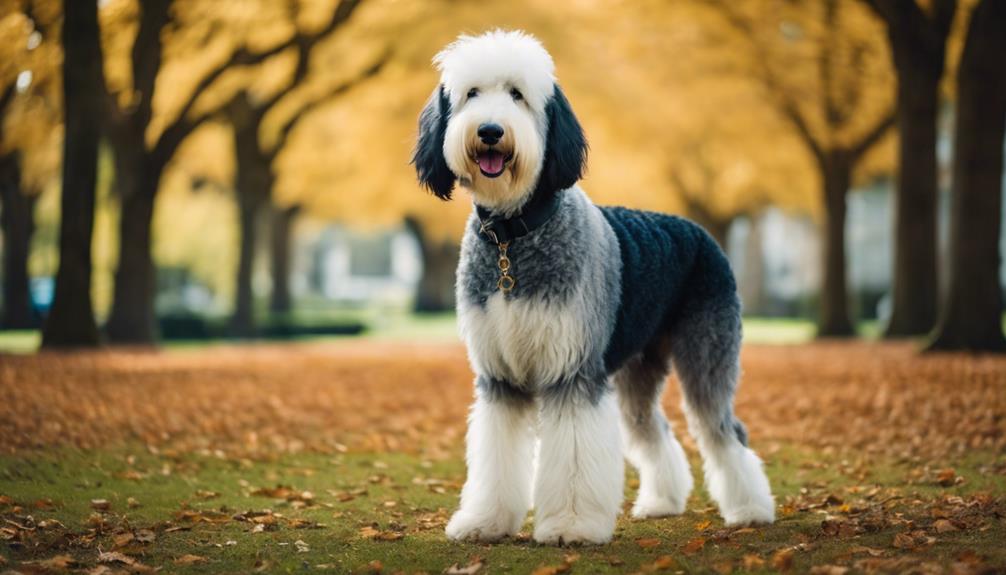
Understanding hip dysplasia in Sheepadoodles is crucial for owners, given the breed’s susceptibility to this condition. We’ll cover critical areas, including early detection methods, treatment options, preventative strategies, and the importance of responsible breeding.
Detecting hip dysplasia early in Sheepadoodles is vital. Regular check-ups and being alert to symptoms can help catch the condition early, leading to better management options. Treatments vary, aiming to ease discomfort and improve the dog’s life quality. Options range from physical therapy to surgery, depending on severity.
Preventative measures can significantly lower the risk of hip dysplasia. These include maintaining a healthy weight, appropriate exercise, and feeding a balanced diet. Responsible breeding is also crucial. Breeders should ensure parent dogs are free from hip dysplasia to decrease the risk in puppies.
This approach offers a comprehensive view of managing hip dysplasia in Sheepadoodles, highlighting the importance of early detection, effective treatment, preventative care, and responsible breeding practices.
Identifying Hip Dysplasia
Spotting hip dysplasia in larger dog breeds like the Sheepadoodle is critical because it directly affects their hip joints, leading to discomfort and reduced mobility. This condition can make dogs less eager to play, jump, or climb stairs, and they may show signs of lameness in their back legs.
To spot this issue, vets start with a physical exam to check the dog’s walk and see if it’s in pain. They then use X-rays and sometimes more detailed scans like CT or MRI. These tests are vital to confirm hip dysplasia and start treatment early on.
Using a clear and direct approach helps identify this joint problem. Early detection means better managing the condition, ensuring dogs can lead happier, more active lives.
Treatment Options Available
After diagnosing Sheepadoodles with hip dysplasia, various treatments help manage the condition and improve the dog’s quality of life. Pain relief medications and anti-inflammatory drugs are vital to making your dog more comfortable.
Physical therapy and exercise plans are crucial for strengthening the muscles around the hip, which can improve joint function. In severe cases, surgery options like femoral head osteotomy or total hip replacement might be suggested.
Keeping your dog at a healthy weight with a good diet and regular exercise is critical to lessen joint stress and manage hip dysplasia effectively. Regular check-ups with the vet are necessary to monitor the condition and update the treatment approach, ensuring your Sheepadoodle gets the best care.
Preventative Care Measures
To reduce the chance of hip dysplasia in Sheepadoodles, keeping them at a healthy weight and engaging them in regular, gentle exercise is crucial. This strengthens the muscles around their hips, promotes healthy development, and lessens the impact on their joints that might worsen the condition—spotting the signs early, like a limp or difficulty moving. Regular check-ups with a vet for hip evaluations can catch issues early for better management.
Responsible breeding is another vital step in preventing hip dysplasia. Breeding dogs should undergo thorough health checks for hip issues before being bred. This practice helps reduce the likelihood of puppies inheriting hip dysplasia, contributing to the breed’s overall health.
Grooming Essentials
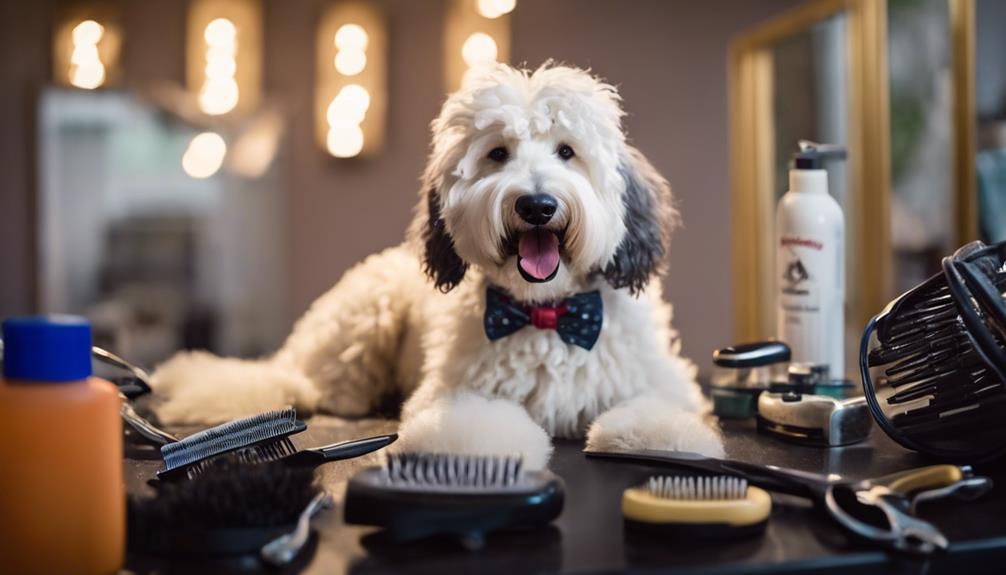
Switching focus from health issues like hip dysplasia in Sheepadoodles, let’s discuss something vital for their well-being: grooming essentials. The unique coat of a Sheepadoodle, which may combine traits from the Old English Sheepdog and the Poodle, requires a specific grooming routine. This includes several key aspects to keep them healthy and looking their best.
Coat Care involves regular brushing to prevent mats and tangles. Given their mixed heritage, Sheepadoodles can have varying coat types, but all need consistent care to avoid skin issues.
Nail Trimming is not just about appearance; it’s crucial for their comfort and health. Long nails can cause pain and lead to problems walking or running.
Ear Cleaning should be part of the routine. These dogs can be prone to ear infections, especially if they have floppy ears. Regular checks and cleaning can prevent these painful issues.
Dental Hygiene is often overlooked but is vital for preventing bad breath and gum disease. Regular brushing and dental treats can help maintain their oral health.
Grooming isn’t just about keeping your Sheepadoodle looking good; it’s about keeping them healthy and happy. Each step, from brushing their coat to cleaning their teeth, is crucial to their overall well-being.
Coat Care Techniques
Keeping a Sheepadoodle’s coat shiny and healthy requires effort, including brushing and visits to a professional groomer. It would be best if you brushed through your Sheepadoodle’s fur several times a week to prevent tangles and keep their coat looking good. Taking your dog to a groomer every few months is also crucial for a thorough cleanup and trim that you might be unable to do at home.
Using the right grooming tools, like a whitening shampoo and a high-quality brush, can make a big difference in your dog’s appearance. Expect to pay around $90 for a grooming session that includes a haircut and bath, but know that unique treatments might cost extra. Regular grooming is more than just making your dog look nice; it’s also about their comfort, Hygiene, and health,
Nail Trimming Tips
Trimming your Sheepadoodle’s nails regularly is essential for more than just keeping them looking neat. It’s about health and comfort. Without proper nail care, these dogs can experience pain from overgrowth, which can also affect their posture and lead to movement injuries. It’s best to trim their nails every 2-4 weeks.
Using the right tools, like dog-specific nail clippers or grinders, makes this task safer and more effective. But knowing how to do it right matters, too, as cutting too close to the quick can cause bleeding and pain. If you’re not confident in your nail-trimming skills, it’s a good idea to ask for help from a professional groomer or vet. They can ensure your Sheepadoodle’s nails are trimmed correctly, keeping your pet happy and healthy during grooming sessions.
Ear Cleaning Routine
To keep your Sheepadoodle’s ears healthy, it’s essential to clean them regularly. This means using safe, vet-recommended cleaning solutions to ward off infections and remove wax buildup.
Sheepadoodles are known for their loving and playful nature but need extra ear care. Cleaning their ears involves softly washing the ear canal to remove wax and debris. Be careful not to use cotton swabs or to push anything deep into the ear, as it could hurt them.
If you notice your dog scratching its ears or any redness, smell, or discharge, these could be signs of an ear problem. A weekly ear-cleaning routine can make a big difference. It helps keep your Sheepadoodle comfortable and prevents ear infections, ensuring they stay happy and healthy.
Dental Hygiene Practices
Ensuring your Sheepadoodle’s dental health requires daily brushing. Use a dog-specific toothbrush and toothpaste to keep their teeth clean and reduce the risk of plaque and tartar. This step is critical for their oral Hygiene and helps prevent dental diseases.
Adding dental chews and toys to your dog’s daily routine can help clean their teeth, too. These items work by scraping off plaque and tartar as your dog chews on them. It’s like giving them a fun activity that keeps their teeth clean.
Regular vet visits for professional dental cleanings are crucial. They help tackle dental problems that can’t be fixed with just home care. Keep an eye on your dog’s breath, gum color, and how they eat. Changes can signal dental issues.
Following these steps will keep your Sheepadoodle healthy and happy. Regular brushing, fun dental chews, and check-ups with the vet make all the difference in preventing dental problems.
Brushing Frequency Recommendations
Keeping a Sheepadoodle’s coat healthy and free from mats requires brushing it daily. This daily routine helps spread their skin’s natural oils, keeps shedding under control, and prevents knots from forming. Since Sheepadoodles have coats that vary significantly in length and texture, these factors can increase the likelihood of tangles.
Brushing daily helps remove dirt, prevents mats, and allows you to spot any skin problems early, keeping your dog’s coat and skin in top condition. Although the frequency of brushing might need to be adjusted based on the dog’s specific coat type and how active they are, it’s best to stick to a daily brush.
Having your Sheepadoodle professionally groomed periodically can also help care for their coat’s needs and ensure they look and feel great.
Dietary Needs Overview
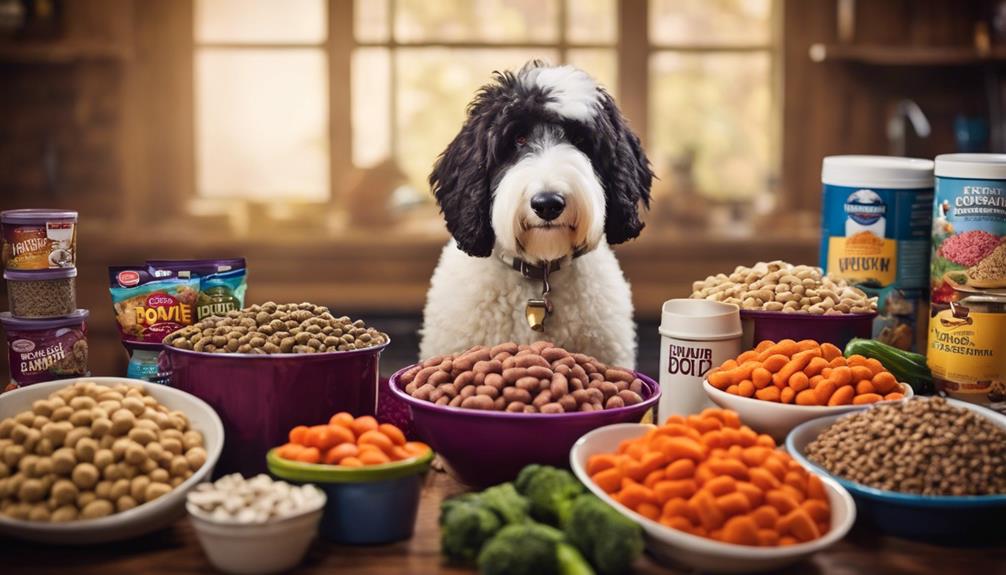
Maintaining the health and energy of Sheepadoodles starts with their diet. We must focus on what we feed them to keep them happy and healthy. Here are the basics:
- Choose foods that match their high energy levels. This means picking options that will fuel their playful and active nature.
- It’s crucial to know what nutrients they need. This includes balancing proteins, fats, and carbohydrates to support their health.
- Feeding them at consistent times each day helps keep their energy levels stable. This routine supports their metabolism, ensuring they’re always ready for the next adventure.
- Monitoring how much they eat is just as important as what they eat. This approach prevents weight issues and ensures they get just the right amount of nutrition without going overboard.
Optimal Food Choices
Choosing the right foods for Sheepadoodles is crucial for their health and happiness. These dogs need a diet that provides all their required nutrients to stay active and healthy.
For young Sheepadoodle puppies, it’s best to feed them food specifically designed for large breeds to support their growth. As they age, monitoring their portion sizes to avoid overfeeding is essential, which can lead to health issues.
Feeding them two meals a day helps keep their energy levels steady and maintains their ideal weight. Paying close attention to how many calories they consume each meal is critical.
This routine helps ensure Sheepadoodles get the nutrition they need without overeating. Keeping track of their diet in this way supports their overall health and well-being.
Nutritional Requirements
Knowing what to feed Sheepadoodles is vital to keeping them healthy and full of energy. They need a diet that covers all the essential nutrients to meet their high energy demands and support their health. Choosing food that matches their size and how much they move around is necessary to ensure they get what they need. For young Sheepadoodles, picking large-breed puppy food helps their fast growth. Avoid giving them too much food because it can cause health problems.
Setting a regular feeding routine with measured amounts helps prevent overeating and keeps Sheepadoodles in good shape. This approach helps meet their dietary needs without going overboard.
Feeding Frequency
Determining the proper nutrition and feeding schedule for Sheepadoodles is crucial for their health. For adult Sheepadoodles, eating twice a day helps them keep a balanced diet and prevents them from overeating at once. This schedule varies based on their age, size, how active they are, and their overall health.
Puppies need to eat more often to support their fast growth. It’s not a good idea to give Sheepadoodles human food, as it can cause nutritional problems and upset their stomachs. Talking to a vet can help you decide the best feeding times and how much food to give, ensuring your Sheepadoodle’s diet meets their needs.
Frequently Asked Questions
Is a Sheepadoodle a Good Dog?
- Sheepadoodles are great for families.
- They learn quickly, making training easy.
- Grooming needs are moderate, not overwhelming.
What Is the Downside of Sheepadoodles?
- Sheepadoodles need frequent grooming.
- They have boundless energy for daily exercise.
- Separation anxiety can be a challenge.
Do Sheepadoodles Have Health Issues?
- Sheepadoodles may develop hip dysplasia and eye issues.
- Bloat is a serious concern; regular vet checks help.
- They need daily exercise; allergies and lifespan vary.
What Is a Sheepadoodle Price?
- Sheepadoodle prices vary due to the breeder’s reputation and location.
- Costs span $2000 to $4000, higher for unique patterns.
- Ethical breeding practices and market demand influence them.

